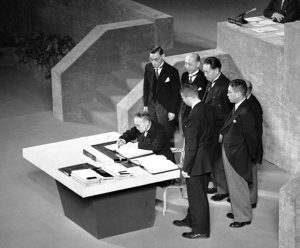Following President Joe Biden’s decision to withdraw U.S. forces from Afghanistan, he spoke about ending America’s efforts to “remake other countries.” He went so far as to say that the United States “did not go to Afghanistan to nation-build.” The tone of the statement was somber. By rejecting nation-building, Biden implicitly acknowledged the criticism that the United States has used this objective to justify military action before.
From Vietnam to Haiti to Afghanistan, to name but a few, the world has witnessed Washington’s seemingly well-intentioned endeavors prove detrimental. The U.S. has tried giving war-torn nations a new identity to promote democracy – and American interests. Many attempts at regime change have been ventured, without success. Yet in spite of its decades-long poor track record, the United States kept going on the same mission, with the same (misguided) optimism, expecting a different outcome each time. The creation of functional democracies does not work in the fashion of “if you build it, they will come.” The United States’ endeavors at nation-building, coupled with the use of force, have rarely paid off.
With its longest war ending, at least for now, is the United States really ready to give up on its nation-building ambitions? Or is there an enduring memory of successful nation-building that is burned into the American psyche so deeply that the U.S. cannot help but to reminisce and try to recreate those triumphs?
The last major successes in this vein date back 75 years, to the rehabilitation of post-war Japan and West Germany.
In 1945, Japan, having suffered two nuclear bombings, not only unconditionally surrendered the Imperial General Headquarters and all of its military forces, but also handed the United States a relatively smooth transition, with only one notable attempted coup d’état (the Kyujo incident). Over the next seven years, the U.S. led reconstruction and reform across Japan’s military, political, economic, and social realms. This effort encompassed the Tokyo Tribunal, dismantling the Japanese Army, downgrading the emperor’s status to an apolitical figurehead, and drafting a new Japanese Constitution. The process addressed punishment, reform, and economic recovery, and benefited the U.S. during the Cold War. Defense cooperation between the two nations was solidified through the signing of the U.S.-Japan Security Treaty in 1951. From the perspective of the victors, this was a textbook case of successful post-conflict nation-building based on democratic principles.
However, Japan is not a case study from which to draw parallels with other nations. Its society was much less fragmented in terms of ethnic and religious diversity and, more importantly, democracy had been previously fought for, sought, and enjoyed by its people. Indeed, the first Japanese petition for an elected assembly was submitted in 1873. This liberal movement, known as the Taisho democracy, persisted until the advent of military rule. As with any democratic foundation, the odds of success are much higher when the philosophy has previously been accepted by a people. Notably, the United States’ other great success story in nation-building – Germany– shared the qualities of relative homogeneity and its own democratic history.
The same level of success, however, was not easily replicated. There have been small achievements in other cases, but the unification of peoples in target countries, which is the first step and a vital component of nation-building, has been problematic. Perhaps it is time for the U.S. to recognize its successful nation-building in Japan as an outlier and neither a model nor a norm.
Because the United States has failed so many times in its attempts at democracy-centered nation-building, the image of democracy itself has been called into question. The distinction has been blurred between opposing U.S. nation-building and denying democratic ideas en masse. This is a disturbing trend.
With the slow but steady re-emergence of autocracy and authoritarianism, the United States has an important role to play in promoting democracy. As Winston Churchill once said, “No one pretends that democracy is perfect or all-wise… democracy is the worst form of Government except for all those other forms that have been tried from time to time.” Democracy is not merely about elections and majority rule; notwithstanding its imperfections, democracy is still the best instrument we have with which to protect human rights and improve equality.
In spite of the Biden administration’s current pronouncements, the U.S. may, over time, again feel compelled to try nation-building again. It is, therefore, imperative that policymakers and advisers perform a postmortem to find an acceptable, sustainable, and supportive way by which to promote democracy. Now we know what does not work, figuring out an alternative that might work is an entirely different challenge.

































